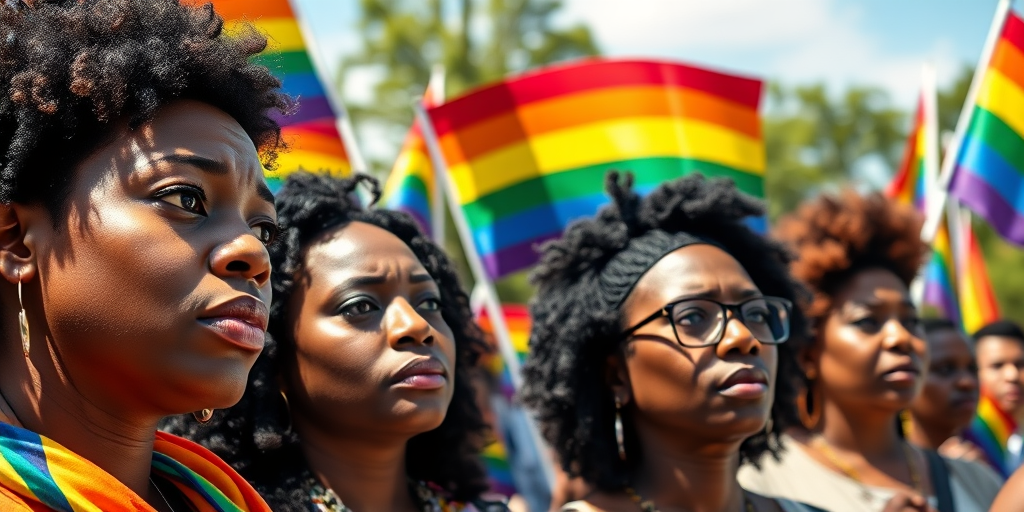Proposed Medicaid Cuts Endanger Black LGBTQ+ Lives
Capital B News, a nonprofit organization committed to Black-focused independent journalism, is shedding light on a looming healthcare crisis threatening Black LGBTQ+ communities in Georgia. At the forefront of this issue is the proposed reduction of Medicaid funding, a move backed by congressional Republicans and the Trump administration as part of broader fiscal strategies. Such cuts, if enacted, could severely restrict access to vital healthcare services, posing a grave threat to Black LGBTQ+ lives, particularly in regions like Atlanta with dense African American populations.
The Vital Role of Medicaid
Medicaid is a cornerstone for health coverage among many Black and LGBTQ+ communities, functioning as a lifeline for essential services that range from HIV medication and gender-affirming care to mental health and substance abuse treatment. The Trump administration’s proposal aims to mitigate federal spending impacts from extending 2017 tax cuts for higher-income earners, leading to significant concern among advocates.
Tori Cooper of the Human Rights Campaign underscores the profound impact these budget reductions could wield. “The Black LGBTQ community will be greatly impacted, and Black trans folks even more so,” Cooper states. “Systematic racism has always resulted in inferior health outcomes for marginalized groups, and these cuts will only exacerbate the issue.”
Local Impact on the Community
In Georgia, a state where Medicaid expansion has been continuously rebuffed, the potential reduction in federal Medicaid funding threatens devastating outcomes for vulnerable populations. According to the State Health Access Data Assistance Center, roughly one in four Black Georgians rely on Medicaid, compared to one in ten White Georgians. Any scaling back of Medicaid services could disproportionately hit Black LGBT+ residents dependent on the program for healthcare access.
Victoria Kirby York of the National Black Justice Coalition points out, “Nationally, Black LGBTQ residents are twice as likely to be enrolled in Medicaid compared to the general population. Should these cuts materialize, it places critical health services at risk, particularly for gender-affirming care, mental health, and treatment for substance abuse.”
Concerns for the Future
Georgia’s healthcare challenges are further exacerbated by high HIV rates and limited access to care. Advocates like Maxx Boykin from Save HIV Funding warn that Medicaid cuts might exacerbate HIV transmission and limit access to necessary medical treatment for people living with HIV. Boykin emphasizes, “Medicaid is the largest source of insurance for people with HIV. Less funding means fewer medications, and higher transmission rates are a likely outcome.”
Furthermore, potential cuts to SNAP benefits compound these healthcare challenges, potentially eroding overall health by compromising nutrition. Matthew Rose of the Human Rights Campaign highlights, “Hunger weakens the immune system, leading to increased susceptibility to illness—it’s a compounding issue when combined with reduced healthcare access.”
Past and Ongoing Issues
Historically, the Georgia General Assembly has refused to expand Medicaid, leaving countless residents uninsured and vulnerable. The Black LGBTQ+ community has long faced an intersection of challenges tied to both racial and gender discrimination, amplifying health disparities. Maisha Standifer from the Satcher Health Leadership Institute notes, “We see, particularly in aging populations, that compounded health issues demand more responsive care strategies. Cuts jeopardize these necessary interventions.”
Encouraging Advocacy
In light of these developments, advocates urge community action. Raising public pressure on representatives through calls and messages becomes imperative. “Community engagement is our strongest tool against these proposals,” asserts Boykin. “We must hold elected officials accountable across all levels of government to ensure protective measures remain in place.”
Community Resources and Support
Capital B News continues its mission of amplifying Black voices, urging community support, and providing indispensable news coverage. Residents are encouraged to stay informed and connected through initiatives such as Capital B’s newsletters—”Seen & Heard” and “Everything’s Political”—which delve into pertinent topics affecting Black America.
For additional insights and community guidance, residents can seek assistance through local organizations, stay connected with updates from the Kaiser Family Foundation, and contribute to grassroots efforts advocating for equitable healthcare solutions.
Capital B maintains its commitment to telling stories that matter—a reflection of its ongoing support from a dedicated readership and donor community. Through collaborative efforts, there’s a determination to foster informed engagement and combat emerging threats to community welfare, ensuring the voices of Black and LGBTQ+ individuals resonate in vital policy discussions.







